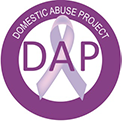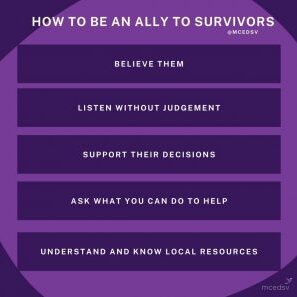By Liz B., Administrative Specialist
As a friend or relative, watching someone you care about in a domestic violence relationship is frightening. It’s also frustrating when it’s clear that they are in an unsafe situation but don’t seem to want to leave or acknowledge the problem. It can be hard for someone to recognize they are in a domestic violence situation. Domestic violence is a complex cycle of power and control and it can take a long time before the victim is ready to ask for support.
Domestic violence relationships consist of a victim and an abuser, with the relationship ultimately becoming about power and control. The abuser in the relationship uses tactics such as manipulation, isolation and fear to control their partner. Domestic violence is a cycle, many times there is a Honeymoon Phase where it’s calm in the relationship and the abuser makes promises that it will be better. Over time this transitions into the Tension Building Phase where the abuser might isolate the victim, becomes moody and threatens to destroy property. This leads to an Acute Explosion where the abuser might become physical, hitting their partner and breaking property. The cycle begins again with the Honeymoon Phase- empty apologies and promises.
Many times a support person will wonder: why don’t they just leave? Abuse takes many forms and does not always include physical harm. When asking why someone might not be willing or able to leave a domestic violent relationship, economic abuse can be a reason. An abuser may have control of a victim’s money, important documents and financial information. This is an additional layer to navigate as someone tries to leave an abusive situation.
Offer Supportive Listening
When we see someone we care about struggling, the natural impulse is to help make the situation better and fix the problem. Sometimes it’s ok to simply sit and listen. It’s important to meet a loved one where they are; validate their feelings and offer supportive listening. A good question to ask is, “Do you want sympathy or do you want to problem solve?” Many times the situation can be overwhelming. Talking through what is happening is a way to help them process and figure out next steps.
Safety Is Key:
The most dangerous time for someone is when they have left the relationship. This is because the abuser has lost their power and control. Because of this, it is important to have a safety plan. As a support person, it might be helpful if you offer to sit with your loved one as they call DAP’s 24/7 crisis hotline to come up with a safety plan. Some basic safety planning can include:
- Keep a charged cell phone with you at all times. Consider purchasing a pre-paid cell phone that you keep hidden and charged in case of emergencies.
- Be cautious of what you are posting on social media. Re-check privacy settings and refrain from posting your location.
- Hide important documents in an easily accessible and safe place.
They Are Not Alone
1 in 3 women and 1 in 7 men have experienced domestic violence. Domestic violence survivors can feel embarrassment and shame because they blame themselves for their situation. The abuse is not their fault. Encouraging someone to take the first step could look like helping them find local domestic violence resources. Once they are ready, DAP’s crisis hotline is available 24/7 to listen and provide them options. Our hotline advocates can answer questions about DAP services and what to expect while working with our agency for counseling, support groups or obtaining a Protection from Abuse Order (PFA).
If you, or someone in your community is in an unhealthy relationship, DAP’s 24/7 crisis hotline number is 610-565-4590.


